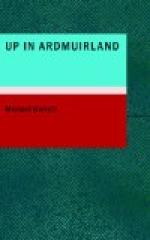Bell dwelt under the same roof as the priest until she was needed at home, a few years later. Although chiefly employed during the day in looking after the two cows that grazed on the hillside about a mile distant, and driving them out and in, she was sufficiently within doors to be able to gain much knowledge of the daily life of a simple Scottish pastor of the old school.
That life, as her reminiscences witness, was one of extreme homeliness—not to say austerity. The food of the priest was that of the ordinary peasant class among which he lived. “His denner,” said Bell, “wes juist tatties, taken in their skins; his supper wes brochan an’ sometimes tatties as weel. Some o’ the neebors would come an’ join him, whiles, an’ share the supper wi’ him, as they sat roond the hearth.” (In answer to my query Bell explained that “brochan” was a kind of soup or gruel, made from oatmeal.)
“My faither an’ mither,” Bell remarked with some pride, “usit often to tak’ denner wi’ the priest o’ Sundays. They wes bidin’ a good bit awa’ frae the chapel, ye ken, sir, an’ they aye likit a talk wi’ me aifter Mass. So Mr. McGillivray wouldna’ aloo them to fast till they got hame, but aye pressit them to stay. For they wouldna’ break their fast till the priest did, ye ken; it had aye been the custom in their young days, and they keepit it till they wes too weak to fast sae lang.”
Besides the Ardmuirland district, the priest had charge of two others at some little distance over the hills in different directions. It was his duty to say Mass at one or other of these stations occasionally, and the Ardmuirland folk who could conveniently manage the journey would generally accompany him on a Sunday. They would walk over the hill in a kind of unorganized procession, reciting the Rosary and litany as they went.
During the week the priest kept daily moving about among his people, and little of interest could happen which did not soon come to his knowledge. “The fowk aye enjoyit a chat wi’ the priest,” said Bell, “for Mr. McGillivray wes the best oot at tellin’ auld-fashioned stories.” His figure was a familiar one in all the countryside, as he walked slowly along, leaning on his silver-mounted walking-stick, and wrapped in the ample folds of a well-worn Spanish cloak, buckled at the neck by a silver clasp. Under that same cloak he would often carry tit-bits of oatcake for the horses he might come across in the farms he visited—for he was a lover of all dumb creatures.
Mr. McGillivray’s only outdoor recreation was fishing. Children knew his ways, and would shyly steal after him down to the side of the burn and watch him from a distance. When his rod happened to get caught in the branches of the stunted birches which bordered the stream—which was not of infrequent occurrence—they would run to his assistance and help to untangle the hook; they would often search for and carry to him worms to serve as bait. Both kinds of service were sure to be rewarded by a piece of “black sugar,” as Bell styled licorice, which he always carried with him for use in such emergencies.




